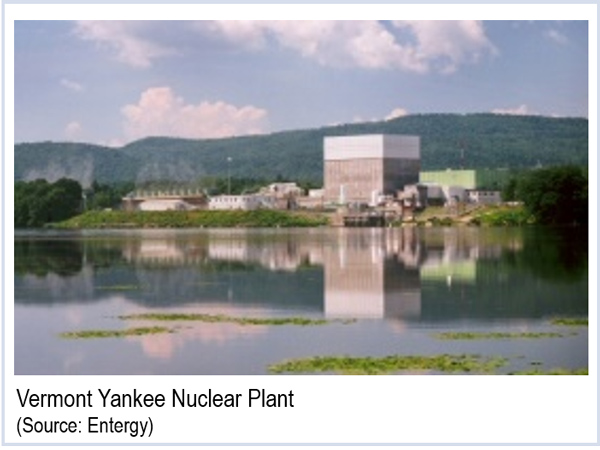On a party-line vote, the Senate Appropriations Committee voted 16-14 to approve a $30 billion spending bill that reduces funding for the Environmental Protection Agency and the Interior Department.
The approved funding is $400 million less than what was approved for 2015. It’s also $2.2 billion less than what the Obama administration was seeking.
Sen. Barbara Mikulski (D-Md.), the ranking member on the committee, said Democrats would oppose the bill. Sen. Tom Udall (D-N.M.) said the bill takes direct aim at the Clean Air Act, the Clean Water Act and the Endangered Species Act.
Under the bill, the EPA would be banned from enforcing the carbon mandates in states that have signaled opposition to the regulation.
More: The Hill
NRC says Entergy Can Use Decom Fund for Fuel Storage

Before Entergy can tap into the decommissioning fund, NRC said the company must first spend $143 million in a line of credit. NRC said it believed that Entergy has sufficient funds invested in the fund to cover decommissioning costs over the next 60 years.
More: VTDigger.org
Tritium Found in Groundwater at Exelon’s Peach Bottom Plant

“It’s possible that the water could eventually migrate into the plant’s outlet canal, and from there it could make its way into the [Susquehanna] River,” NRC spokesman Neil Sheehan said. “If so, the potential dose would be negligible. If the amount were to make its way into the Susquehanna, the dilution effect would be so great that, even if you were to take multiple water samples, it would not be detectable.” Exelon is still working to determine how the tritium escaped and to devise a remediation plan.
Paul Gunter, a director of the public interest group Beyond Nuclear, said NRC’s finding is troubling. “This is a one-off measurement in one well,” he said. “It doesn’t say how much got out. This is what they detected at that one point.”
More: York Daily Record
NRC Considering Development of Small Nuclear Reactors
The Nuclear Regulatory Commission is ready to start accepting design specifications for reactors in the 300-MW range, and the Energy Department is spending more than $450 million to assist in the licensing of plants using the smaller reactor.The move toward examining and encouraging the development of smaller reactors has gained the interest of several federal lawmakers, including Sen. Lisa Murkowski (R-Alaska), chair of the Senate Energy and Natural Resources Committee. “I have long supported and advocated for the development and deployment of small modular reactors,” she said recently.
Most commercial reactors, including several in ongoing projects around the world and in the U.S., are greater than 1,000 MW. Proponents say the smaller reactors, which can be built off-site, would help cut greenhouse gases at a lower cost.
More: The Hill
Environmental Group Asks FERC to Expand Comment Deadline for Pipeline
The Blue Ridge Environmental Defense League filed a formal request with the Federal Energy Regulatory Commission to extend the deadline for public comment on the proposed 300-mile Mountain Valley Pipeline, which would transport natural gas from northwestern West Virginia to southern Virginia.
“The FERC has certainly not gone out of its way to ensure that the public’s voice is heard,” said Anne Armistead, a member of Preserve Floyd, part of the Blue Ridge Environmental Defense League. “I could not even get the e-comment feature to work on the day of the deadline when I tried to submit my comment.”
The group said the June 16 deadline didn’t allow the public time enough to learn about and comment on the proposed pipeline and that technical problems prohibited attempts to file comments electronically. Others complained that even when they did show up for public comment sessions, they didn’t get a chance to speak.
More: SWVAToday.com
DOE Investigating Worker Exposure at Nevada National Security Site
The Energy Department is investigating possible radiation exposure of workers at the Nevada National Security Site.
Two incidents took place last year at the National Criticality Experiments Research Center, located at the site. Both incidents involved highly enriched uranium used in nuclear weapons. But the department’s Office of Enforcement said exposure levels were “extremely small and health risks essentially zero.”
More: Las Vegas Review-Journal
Massachusetts Town Sues FERC for Allowing Pipeline Construction
Dedham, Mass., has sued the Federal Energy Regulatory Commission for approving construction of a natural gas pipeline before the town’s appeal against the project had been heard.
FERC approved the Algonquin Incremental Market project in March, allowing for the construction of a spur, or lateral line, through the towns of Dedham and West Roxbury. The town appealed the ruling, but FERC allowed construction to begin before hearing the appeal.
Dedham argued that FERC’s decision was illegal and asked the U.S. District Court of Massachusetts to halt construction. Boston Mayor Martin J. Walsh, U.S. Rep. Stephen Lynch and several other local politicians have written FERC threatening to sue if the commission does not halt construction until it hears the appeal.
More: Boston Globe


